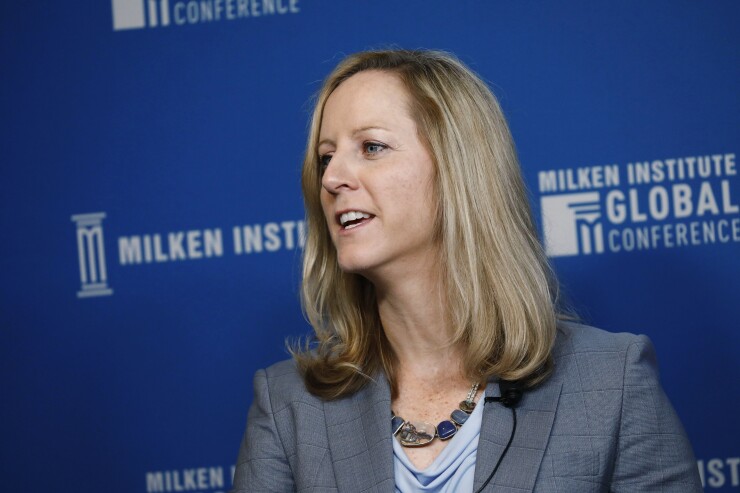The Consumer Financial Protection Bureau released a plan Tuesday to restrict how often debt collectors can call borrowers about unpaid credit and to allow consumers to opt out of other types of communications.
The
The CFPB plan would for the first time establish rules for debt collectors using technologies developed after the Fair Debt Collection Practices Act passed in 1977. In cases where a borrower did not opt out, debt collectors would be permitted to contact consumers using email and texts with no weekly limit and without having to validate a debt before collecting on it.

The CFPB said in its proposal that the industry has faced conflicting court rulings about the use of email, text and voice mail.
"Some questions, including those related to communication technologies that did not exist at the time the FDCPA was passed … have been the subject of inconsistent court decisions, resulting in legal uncertainty and additional cost for industry and risk for consumers," the agency's proposal said.
The 538-page proposal applies only to collection agencies, debt buyers, collection law firms and loan services covered by the FDCPA. Banks and other first-party creditors are exempt from the debt collection law. Companies have will have 90 days to comment on the CFPB's notice.
The CFPB said the plan would provide consumers with "clear protections" from harassment by debt collectors and “straightforward options” to address or dispute debts.
But in a win for the industry, the plan offers a number of safe harbors to protect debt collectors from being sued. A collector that submits a notice validating a debt to a consumer upon their initial exchange would receive a safe harbor from liability, as long as the collector follows certain steps outlined by the consumer bureau.
Under the plan, debt collectors would be prohibited from suing or threatening to sue a consumer to collect a debt that a collector knows or should have known is older than the statute of limitations. Still, debt collectors would not be required to obtain the documents needed to determine whether a debt is too old to be pursued in court.
The plan also would require debt collectors to notify a consumer first before sending information about a debt to a credit reporting agency, a clear win for consumers.
“The Bureau is taking the next step in the rulemaking process to ensure we have clear rules of the road where consumers know their rights and debt collectors know their limitations,” CFPB Director Kathy Kraninger said in a press release. “As the CFPB moves to modernize the legal regime for debt collection, we are keenly interested in hearing all views so that we can develop a final rule that takes into account the feedback received.”
Immediately after the plan was released, debt collectors objected to any limits on the number of attempted phone calls, claiming a one-size-fits-all approach to that restriction would not work. While debt collectors would be restricted to seven phone calls per week, once a phone conversation takes place, the debt collector would have to wait at least a week before calling the consumer again under the proposal.
"We think there are several areas that need to be clarified and improved upon before the rule is finalized, including the arbitrary limit on call attempts that could unnecessarily impede communications with consumers," said Mark Neeb, CEO of the Association of Credit and Collection Professionals, known as ACA International, a trade group.
A CFPB spokeswoman stressed that the proposal does not give debt collectors' free reign to use text and email messaging.
"Contrary to what is being reported, the proposed rule does not allow debt collectors to send an unlimited number of text messages or emails," the CFPB said. "Both the proposed rule (and the FDCPA) make clear that a collector who texts or emails too frequently faces liability if the consequence of the communications is harassment, oppression, or abuse of any person."
The statement continued: "In addition, the proposed rule would require collectors to include in every text message and email they send an option consumers can use to unsubscribe. And debt collectors would violate the rule if they continued to contact consumers at particular phone numbers for text messages or email addresses after the consumer asked them to stop.”
Yet clearer rules on companies' ability to use text messages and emails would be a huge benefit to debt collectors. Several large publicly-traded companies that buy and sell debts globally have discussed on earnings calls how the use of text and emails would allow them to cut call-center costs and ramp up collections.
The proposed rule also would give consumers the ability to limit how they are contacted. In addition to being able to opt out of emails and text messages, consumers would be able to elect if they only want to be contacted at a specific phone number or during a specific time of day.
“A consumer need not use specific words to assert that a time or place is inconvenient for debt collection communications,” the proposal stated.
A 2016 debt collection proposal drafted under former CFPB Director Richard Cordray sought to restrict collection attempts to six per week and would have required confirmation of a debt before a collector could contact a consumer. But that proposal was never finalized. Consumer advocates
The current proposal would require debt collectors to send consumers a disclosure itemizing the debt and "plain-language information" about how a consumer may respond to a collection attempt, including how to dispute a debt. Disclosures would be required to include a “tear-off” that consumers could send back to the debt collector.





